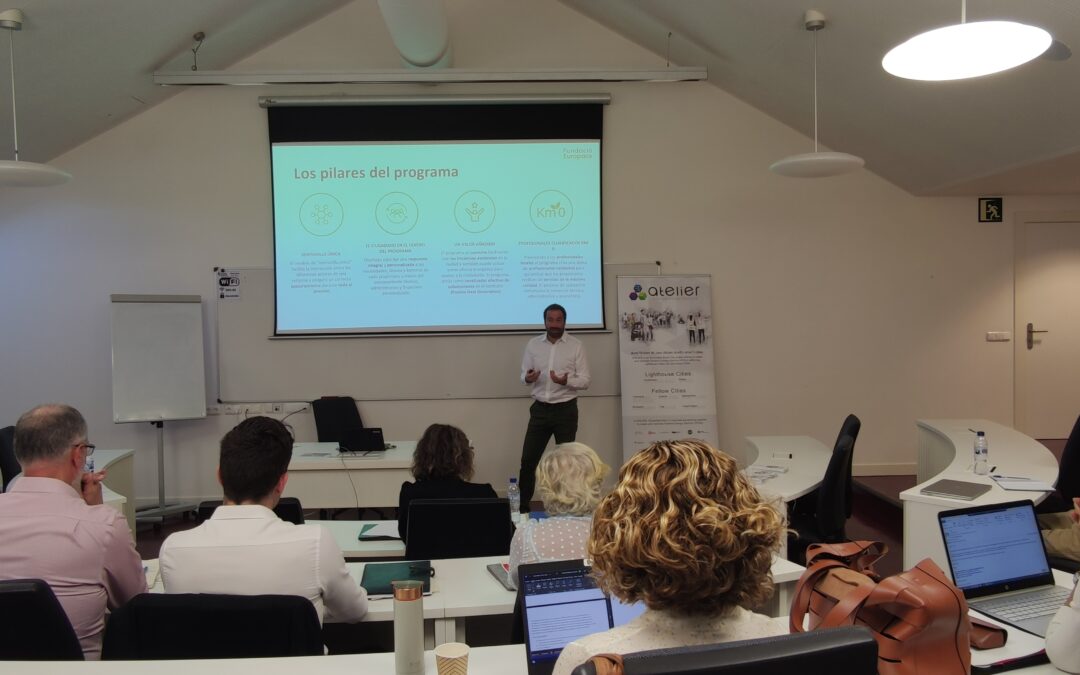In the framework of Bilbao Lighthouse, Bilbao Innovation Atelier (BIA) is a meeting forum aimed to involve relevant stakeholders in fine-tuning the innovations accomplished to the context of Bilbao city, disseminate the project progress and provide knowledge and good practices to scale the results to other districts and cities. Since its establishment in early 2020, Bilbao Innovation Atelier has organized and conducted 13 workshops around several topics such as electrification of heat demand in PEDs, digitalization of urban assets or energy communities, among others.
In particular, this workshop is the fourth in a series dedicated to “Experiences and best practices in financing energy savings”, whose objective is to share best practices and generate knowledge on experiences of public-private collaboration for financing energy savings. The three previous workshops held were focused, respectively, on financing instruments in the framework of PED development, on the building renovation programme carried out in Zorrotzaurre in the period 2009-2020 and on a set of success stories about energy efficiency financing shared by relevant stakeholders.
The workshop was held on 28 September at the headquarters of the Business School of Deusto (Bilbao) and featured an outstanding panel of speakers from Bilbao City Council (Jon González), EuroPACE Foundation (Jordi Ayats), Bilbao Municipal Housing (Rosario Vallejo), Iberdrola (Tomás Humada), and Mugabi (Aznar Sánchez). Overall, it was attended by representatives of 10 companies and organisations.
The panellists addressed the role of ESCOs, one-stop shops and private initiative in energy savings from the perspective of their respective organisations. After a brief introduction of the ATELIER project and the actions planned in the Zorrotzaurre district by the Bilbao City Council, the guest speakers were introduced.
Jordi Ayats presented the EuroPACE Foundation, whose objective is to find effective solutions to combat climate change and at the same time improve people’s lives by working on two axes: decarbonisation of buildings and promotion of Energy Communities. He then described the DOMUS programme, an innovative programme to promote the energy renovation of homes, which is a successful case of a one-stop shop to promote and facilitate energy efficiency, resolving the main barriers through effective social marketing and 360º personalised support. Through this programme, actions such as GarrotxaDomus and Rehabilita Bizkaia, among others, have been developed.
Rosario Vallejo presented the activity of Viviendas Municipales de Bilbao as the body responsible for executing the municipal policy on subsidised housing and the experience of Otxar OpenGela as a one-stop shop in the Otxarkoaga district. This experience is based, as main pillars, on knowledge and the contribution of technical value, quality and transparency in contracting; on the establishment of a participatory process with decision-making based on reliable information; and on the empowerment of the owners’ community.
For his part, Tomás Humada presented Iberdrola’s activity in integral energy refurbishment, which fits in with its commitment to energy transition and the decarbonisation of society and which aims to be at the same level as the requirements for the construction of new housing. With extensive experience with homeowners’ associations, their status as a refurbishment agent allows them direct access to subsidies and they carry out comprehensive turnkey project management. They carry out aerothermal installations and hybridisation with photovoltaic (BiPV panels and glass) and have several projects underway in this line, such as the case of Torre Efisa in A Coruña.
Finally, Aznar Sánchez presented Mugabi’s work as a rehabilitation agent. Its business focus is oriented towards the servitisation of refurbishment to facilitate and provide security to the client. To this end, they adopt a turnkey model that places the architect, the contractor and the financial institution on the same level, transforming the traditional value chain of rehabilitation. For each project, they establish an aid plan, a fixed price and a personalised payment plan.
The presentations were followed by an open dialogue between the panellists and the audience, in which various questions were answered and points of view were exchanged in relation to the main lessons learned from the energy saving models developed, the role of public institutions in this context and the importance of encouraging public-private collaboration.
This article was originally published in Spanish on the website of ATELIER partner Cluster Energía: http://www.clusterenergia.com/noticias-asociados-2/bilbao-innovation-atelier-celebra-un-taller-sobre-papel-escos-ventanillas-unicas-y-iniciativa-privada-en-ahorro-energetico
Author: Cluster Energía
Picture credits: Begoña Molinete Cuezva, Cluster Energía
